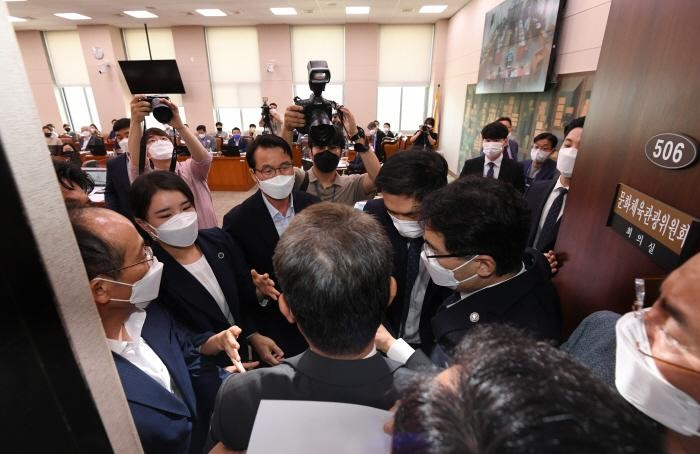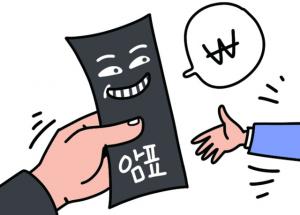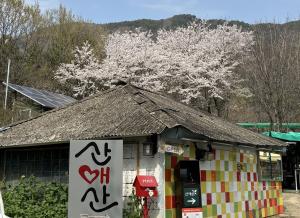 |
| ▲The ruling party and opposition parties having a conflict regarding The Media Arbitration Law (Source:Chosun Biz) |
Since August 17, the Democratic Party, the ruling party of South Korea, has been hurrying to pass legislation that will hold the media responsible for punitive damages, up to five times of the loss caused by false and manipulated reports. The purpose of the legislation is to further prevent damages and social confusion caused by journalists and media outlets reporting false, or provocative content. The power that mass media has is so tremendous, they can have huge impacts on society and national organizations. Therefore, the impact of misinformation is grievous when it is delivered through mass media.
Media often infects public opinion with anxiety and a false distortion of information. For example, the “Mad Cow Disease,” issue in the 2010s, which occurred at a large rally in Gwanghwamun square, then encouraged public opinion to be against the importation of U.S. beef. Additionally, the “Flu Vaccine Deaths”, rumor last year, which resulted in a significantly low rate of vaccination due to prevailing and groundless anxiety. Researchers had found that there were no actual deaths caused by the flu vaccine. Another example was the, “Fan death”, which became a meme regarding death, only existed in South Korea. A news media broadcasted false information regarding the deaths of people living alone, and fans were turned on when they were found dead. This widespread misinformation made Koreans believe in rumors that turning on fans would kill people. In addition, distorted and biased information broadcasted, lead to an impact on people’s businesses, such as issues around the Taiwanese Castella, which had boomed around 2016. Many family-owned businesses had closed due to the defamed images and reputation of the Taiwanese Castella.
In 2019, South Korea ranked 41st in the world’s Press Freedom Index, which was the highest-ranked country in Asia. On the contrary, in the Media Trust Index, an evaluation of how reliable the media can be, South Korea was ranked last. The media has been a dominating power in Korean society by inciting public thoughts based on a political agenda, and there is no system in place to regulate this situation. Through biased misinformation, media outlets, and reporters who were abusing their power, people who have suffered from these abuses, could not make a required effort for correction or compensation for their losses. People or organizations have the least protection from the tyrannies of the media.
However, in the process of legislating the Media Arbitration Law that will make the media responsible for their enormous power of influence, the Democratic Party has been trying to force the passing of the bill, as the majority of lawmakers, belong to the Democratic Party. Furthermore, the ruling Democratic Party claims that the controversies regarding the former minister of the Ministry of Justice, Cho Kook are all because of rumors and false reports of the distorted facts used by the media. The Presidential Election will take place next year, the ruling party is trying to reinforce their weak points. Also, the legislation of the press has been undertaken, immediately after the 2021 by-poll of Seoul and Busan mayorship, which resulted in the ruling party being defeated. The 2021 by-poll was held in Seoul and Busan, which are the two largest cities in South Korea, and the mayors were both from the ruling Democratic party. The Mayor of Seoul City committed suicide, and the Mayor of Busan City, was imprisoned regarding sex scandals. The Democratic Party passed the bill by themselves at 4 a.m. on August 25, without sufficient consultation with the opposition parties, raising suspicions as to why the bill was passed so quickly
When the Democratic Party was not on the ruling side in the 2010s, with the government under the leadership of President Lee Myung-bak, they demanded freedom of the media, and opposing news, as well as media censorship. Ironically, when they became a ruling party, they changed their stance. The U.S.A. and Japan, both developed and democratic countries, are expressing concerns about the implementation of a bill to suppress the media, as well as international journalist organizations regarding the Media Arbitration Law.
There are actual victims who have suffered from excessive media abuse, and there have been social losses, such as people avoiding vaccinations due to unnecessary public fear. A system that prevents this and protects victims of media abuse is required. On the other hand, freedom of the press and the roles of the press in a democratic society are also important. Therefore, the Media Arbitration Law should not be abused as a means of suppressing the media. The law should prevent losses due to fake news by guaranteeing freedom of the press coupled with responsibility. It is also necessary to introduce a system after the ruling party and opposition parties have sufficient discussions, rather than passing a bill urgently at the National Assembly, so that the bill is not favorable to particular political parties. It is hoped that the media will also play responsible and desirable roles, given the fact that it is a group that can have a tremendous influence on a conscientious society.
By Park Hyun-jong, reporter tommyhil4444@gmail.com






